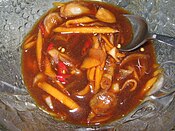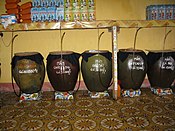List of fish sauces
Appearance

Fish sauce is an amber-colored liquid extracted from the fermentation of fish with sea salt. It is used as a condiment in various cuisines. Fish sauce is a staple ingredient in numerous cultures in Southeast Asia and the coastal regions of East Asia, and features heavily in Cambodian, Filipino, Thai, and Vietnamese cuisine.
Fish sauces
A
- Anchovy essence – used as a flavoring for soups, sauces, and other dishes, anchovy essence is a pink-colored, thick, oily sauce, consisting of pounded anchovies, spices and other ingredients.
B

- Bagoóng – a Philippine condiment made of partially or completely fermented fish or shrimps and salt.[1] The fermentation process also produces a fish sauce known as patís.[2]
- Bagoóng monamon – a common ingredient used in Filipino cuisine and particularly in Northern Ilocano cuisine. It is made by fermenting salted anchovies and is used as a cooking ingredient.
- Bagoóng terong – a common ingredient used in the Philippines and particularly in Northern Ilocano cuisine. It is made by salting and fermenting the bonnet mouth fish.
- Budu sauce – a well-known fermented seafood product in Kelantan, Malaysia as well as Southern Thailand. It is traditionally made by mixing anchovy and salt in the range of ratio of 2:1 to 6:1 and allowing to ferment for 140 to 200 days. It is used as a flavoring and is normally eaten with fish, rice and raw vegetables.
-
Bagoong fermenting in burnay jars in the province of Ilocos Norte, Philippines
-
Budu sauce in Kelantan, Malaysia
C
- Cincalok – a Malaccan food (see cuisine of Malaysia) made of fermented small shrimp or krill. It is usually served as a condiment together with chillis, shallots and lime juice.
- Colatura di Alici – an Italian fish sauce prepared with anchovies, from the small fishing village of Cetara, Campania
G

- Garum – a fermented fish sauce that was used in the cuisines of ancient Greece, Rome, and Byzantium. Garum was prepared from the intestines of small fish through the process of bacterial fermentation.[3]
M
- Mahyawa – a tangy fish sauce made from salted anchovies and ingredients such as fennel seeds, cumin seeds, coriander seeds and mustard seeds. Originally from the southern coastal regions of Iran, it has become a popular food item among Arab states of the Persian Gulf, brought by the migration of the Persian Huwala and Ajam communities to the region.
N
P
- Padaek – a traditional Lao condiment made from pickled or fermented fish that has been cured. Often known as Lao fish sauce, it is a thicker, seasoned fish sauce that often contains chunks of fish in it. Also widely consumed in N.E. Thailand (Isaan) and known by the Lao name.
- Phu quoc fish sauce – a specific variety of fish sauce produced on Phu Quoc island in southwest Vietnam. Since 2001, the Industrial Property Department of the government of Vietnam has the name "Phu Quoc Fish Sauce" as a trademark, and only registered manufacturers are allowed to use the name in Vietnam.[4]
- Pla ra – made by pickling several varieties of fish, mainly Snakehead Murrel (Channa striata), the fish is cleaned and cut into pieces, after which it is mixed with salt and rice bran.
-
Large containers of fish sauce for sale in Vietnam
S
- Shottsuru – a pungent regional Japanese fish sauce, usually made from sandfish, and its production is associated with the Akita region.
W
- Worcestershire sauce – a fermented liquid condiment made with anchovy, it's primarily used to flavor meat or fish dishes. It originated in Worcester, England, and was invented by John Wheeley Lea and William Henry Perrins. The Lea & Perrins brand was commercialized in 1837 and has been produced in the current Midlands Road factory in Worcester since October 16, 1897.[5][6]
-
A 1900 advertisement for Lea & Perrins Worcestershire sauce
-
A label for the Australian Lionel Brand Worcestershire Sauce
See also
References
- ^ J. Dagoon (2000). Agriculture & Fishery Technology III. Rex Bookstore, Inc. pp. 242–243. ISBN 978-971-23-2822-0.
- ^ National Research Council (U.S.). Panel on the Applications of Biotechnology to Traditional Fermented Foods (1992). Applications of biotechnology to traditional fermented foods: report of an ad hoc panel of the Board on Science and Technology for International Development. National Academies. pp. 132–133. ISBN 9789712328220.
- ^ Curtis, Robert I. (1983). "In Defense of Garum". The Classical Journal. 78 (3): 232–240. JSTOR 3297180.
- ^ Ray, Neil (8 May 2009). "Phu Quoc fish sauce to be trademarked". SeafoodSource.
- ^ Keogh, Brian (1997) The Secret Sauce: a History of Lea & Perrins ISBN 978-0-9532169-1-8
- ^ Shurtleff, W.; Aoyagi, A. 2012. "History of Worcestershire Sauce (1837-2012)." Lafayette, California: Soyinfo Center.
Further reading
- Prichep, Deena (October 26, 2013). "Fish Sauce: An Ancient Roman Condiment Rises Again". NPR. Retrieved 5 November 2013.
External links
 Media related to Fish sauce at Wikimedia Commons
Media related to Fish sauce at Wikimedia Commons Media related to Fábrica romana de salga at Wikimedia Commons
Media related to Fábrica romana de salga at Wikimedia Commons The dictionary definition of fish sauce at Wiktionary
The dictionary definition of fish sauce at Wiktionary









